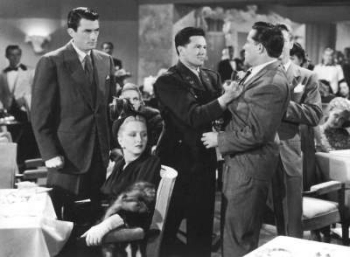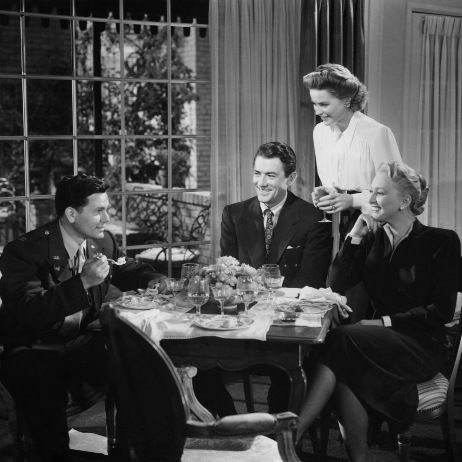As I said yesterday, Gentleman’s Agreement is ostensibly a film about fighting the evils of antisemitism. It comes complete with a subplot involving John Garfield as an actual Jew who is far more heroic than Gregory Peck’s make-believe one.

John Garfield fighting antisemitism;
Gregory Peck and Celeste Holm look on
But it is also something Hollywood takes far more seriously: a romance. There are strict rules governing Hollywood romances, and Gentleman’s Agreement was, in addition to its heavyhanded political message, a Hollywood romance. Moss Hart’s screenplay went by the book: three acts, with each act serving a very particular purpose. In the first act, the Hero meets the Girl, and they both intuitively understand that they are destined to be together. In the second act, a conflict (ideally arising from character flaws) gets the better of them, and by the end of this act the hero and his love are separated.
This moment in a film is generally filled with despair: it could be anything from George Bailey (Jimmy Stewart) stuck in the alternate universe where his wife doesn’t know him in It’s a Wonderful Life to Alex Fletcher (Hugh Grant) trying to pretend his character still makes a lick of sense after the idiotic plot twist that has separated him from his lyricist love interest (Drew Barrymore) in Music and Lyrics (audiences generally know when their intelligence is being insulted by lazy applications of the formula).
Finally in the third act the couple is reunited, wiser and stronger for having weathered their conflict. They and the audience now know that the two lovebirds will have what it takes to raise happy and well-adjusted children together, which is what all the fuss was really about, down there in the subtext.
As written by Moss Hart and directed by Elia Kazan, Gregory Peck’s character of Philip Green finds his dreamgirl in Dorothy McGuire’s character of Kathy Lacy. Although she is a sheltered girl-woman without any interesting thoughts or ideas, and no real sense of the world around her, Kathy has the qualities that post-War Hollywood knew were essential to being a good match for the alpha male: she is really, really pretty, and it is clear that there is no chance at all that she could ever symbolically emasculate Philip by being his intellectual equal.
In a formal sense of screenplay structure, the entire supposed theme of the film – the problem of American antisemitism – is merely a McGuffin to separate the guy and the gal at the end of the second act: Kathy uwittingly reveals that she herself harbors antisemitism. Until she shows that she can overcome this problem, the couple will not be able to get happily together again to start making those babies.
The rules say that this low point in the film needs to be signaled by an event that is utterly catastrophic to the hero’s psychic well-being. In the case of It’s a Wonderful Life, the (very effective) signal is George Bailey turning into a raving violent maniac. In Music and Lyrics the signal is Alex Fletcher betraying Sophie (Barrymore) in a way that is both ludicrous and wildly incompatible with everything the audience has learned about his character in the preceding hour (which is why it’s a terrible movie).
In Gentleman’s Agreement the evil appears in the form of Celeste Holm. Now, it’s important at this point to emphasize that Celeste Holm’s character, Anne Dettrey, is by far the most delightful person we meet in the film. As I said yesterday, she is brilliant, witty, gracious, has a wonderful sense of humor and is enormously perceptive and self-aware.
And yet, as written and directed, the second act slump – the emotional low point in the film, the terrifying pit of ultimate horror from which, once fallen, our hero can never escape, is the moment when Philip, left bereft by his apparent loss of Kathy, agrees to go out on a date with Anne.

Philip Green (Gregory Peck) with his two women
One would think that this turn of events would be a cause for celebration: Philip seems like a sensible fellow, and now he has finally gotten away from that wet blanket Kathy and found himself with a far more interesting woman. Yet the scene is played the opposite way: The independent career gal, brilliant, witty, good natured, fun and self-aware, is shown as the Enemy, the great destroyer, “She Who must be Slain”.
As far as I can make out, this is because she is supposed to be a spinster – a woman who is somehow past her prime, living for a career but secretly desperate for a man. And this makes her damaged goods.
There are so many ironies here. One of them is that Celeste Holm was actually a year younger than Dorothy McGuire when this film was made. Another is that a film which is so proudly and self-consciously focused on exposing the insidiousness of prejudice, is itself the embodiment of an especially snarky and destructive prejudice of its own – a prejudice against women.
There is a positive note to sound here, which is this: A movie that made this particular set of choices would make far less sense to today’s audiences. The enormous struggle by women to be valued as something more than pretty baby-making machines has been very successful – although of course there is a long way yet to go. In this age of the Internet, smart, independent and accomplished women are highly valued, and are recognized as sexy women.
So isn’t it wonderful that a great early feminist icon, the character of Anne Dettrey, was played by none other than the mother of the father of the internet?
When audiences responded to the sheer force of Celeste Holm’s sparkle and wonderfulness in the midst of an otherwise dreary and tendentious film, and the Academy rewarded her performance with a well deserved Oscar, perhaps that was the moment when the cultural tide started to turn. If so, what a wonderful Mother’s Day gift Ms. Holm has given to the world.
heh. Very nice post. I was wondering where you were going with this, to the extent that I did a search after your first one trying to work out the Celeste Holm-feminist link. I failed, of course, so this was a pleasantly unexpected denouement.
Yeehaaa:
A Sensitive New Age Guy!!!